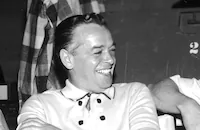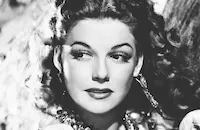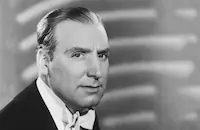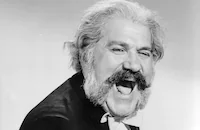Jack Kruschen (1922-2002)
He may have not been a household name, yet his career consisted of over seventy-five films, spanned over six decades, and displayed a strong versatility in playing either dramatic or comic roles with equal effectiveness. He was the definitive, "I can't quite remember the name, but I remember the face" character player who enlivened many films with his robust frame, cherubic face and infectious smile. His name was Jack Kruschen, a superb performer who died on April 2, 2002 at the age of 80, leaving behind a strong body of work that was impressive as any character actor of his generation.
Kruschen was born on March 20, 1922 in Winnipeg, Manitoba, Canada. The son of a watchmaker who later set up shop in Hollywood, he was performing in an operetta at Hollywood high school when a talent scout for CBS radio discovered him. Kruschen was soon doing voice characterizations on popular network programs such as Dragnet, The Danny Thomas Show and Sam Spade. With his gift for dialects (he was most adept at playing ethnic types like Greeks, Yiddish or Italians - a skill finely honed in his radio days), Kruschen was a natural for the movies and soon made his film debut with a small role in the Betty Hutton comedy Red, Hot and Blue (1949).
Kruschen's early career is peppered with a variety of roles like a comical gangster in both Abbott & Costello Go to Mars (1953) and Money from Home (1953) starring Jerry Lewis & Dean Martin; a hard-nosed police detective in Confidence Girl (1952) and Julie (1956), an underrated Doris Day thriller; or doomed victims to alien prey in Sci-fi cult classics: the 1953 version of War of the Worlds (fans remember him as Salvatore, one of the first earthlings to be killed by the invading Martians) and The Angry Red Planet (1959). The roles offered steady work, but not much critical recognition. All that changed when Billy Wilder cast him in the key role as Jack Lemmon's bemused but caring neighbor, Dr. Dreyfuss in The Apartment (1960). As the man who observes the steady stream of women in and out of Lemmon's apartment and the one who saves Shirley MacLaine from a drug overdose, Kruschen offered a wonderful performance - viewing his neighbor's proceedings with a jaundiced eye, yet never letting his disdain overtake his humor and humanity. He was justly rewarded with an Oscar nomination as Best Supporting Actor.
From this point on, Kruschen was seldom out of work, appearing in over 40 films (including a terrific dramatic turn in the original Cape Fear (1962) as Dave Grafton, a corrupt southern bigot) and nearly 60 guest roles on television for the next two decades. Kruschen would later find fame toward the end of his career when he was cast as Papa Papadapolis in the hit sitcom Webster (1985-1987) and would show pleasant variations of the "kindly old codger" throughout the remainder of his career - like his final role in the romantic comedy 'Til There Was You (1997). His death in April this year may have gone largely unnoticed by the movie-going public, but for those of us who treasure the art of the character player, Kruschen's passing was a loss that is fortunately compensated by his strong body of work that will be enjoyed for fans of the late show for many years to come.
By Michael T. Toole
SIGNE HASSO, 1910-2002
Actress Signe Hasso died June 7th at the age of 91. She was best-known for starring in A Double Life (1947) but played numerous Europeans in films during the 1940s. Hasso was born on August 15, 1910 in Stockholm, Sweden and began acting on stage at the age of 13. Ten years later made her first film appearance as Signe Larsson. She was married in 1936 and adopted the last name of her husband, cinematographer and later director Harry Hasso. After a dozen Swedish films, Hasso moved to Hollywood in 1940 where her first screen appearance was an uncredited role in Journey for Margaret (1942). A brief stint at RKO didn't lead to any more promising film parts so Hasso concentrated on her stage career in New York City. Eventually, her film career became more active, thanks to a quick succession of roles, most notably in Fred Zinnemann's The Seventh Cross (1944), Douglas Sirk's A Scandal in Paris (1946) and Henry Hathaway's The House on 92nd Street (1945). However it was her portrayal of Ronald Colman's wife in the Oscar-favorite A Double Life that solidified her fame. But as Hasso continued to act on the stage and TV, her film work began to taper off. She appeared in high-profile thrillers like Crisis (1950), several made-for-TV movies, a few European productions and even the cult murder mystery, Bert Gordon's Picture Mommy Dead (1966). In 1972, the king of Sweden decorated Hasso for her work. Her final appearance was in a 2001 documentary about Greta Garbo.
HERMAN COHEN, 1927-2002
One of the key producers of B-movies, Herman Cohen, died June 2nd at the age of 76. Like most producers, his name wasn't generally known outside the industry or the realms of film buffs but most people never forget the titles of his films: I Was a Teenage Werewolf (1957), Horrors of the Black Museum (1959) and the not-quite-immortal Bela Lugosi Meets a Brooklyn Gorilla (1952). Cohen was a Detroit native, born August 27, 1927. He entered the film business in the smallest possible way, as a 12-year-old janitor, often accepting passes for his family and friends instead of wages. Cohen served in the Marine Corps (several articles incorrectly say the Army) before becoming a publicist at Columbia Pictures. By 1951 he was working as a producer's assistant on low-budget independent films, mostly for Realart Pictures run by another Detroit native Jack Broder. Soon Cohen was producing his own movies, including Westerns and mysteries, until hitting big with the famous I Was a Teenage Werewolf. Starring a then-unknown Michael Landon (under personal contract to Cohen who later tore it up so Landon could appear in Bonanza), the film was made for $100,000 but in just a few months grossed over $2 million. Cohen didn't hestitate to turn out I Was a Teenage Frankenstein and Blood of Dracula by Thanksgiving of that same year and before long had made several films that continued to earn money for years to come. (One TCM writer remembers Horrors of the Black Museum turning up in a small Alabama town in the early 70s, over a decade after its initial release. The film is scheduled for a DVD release with a Cohen commentary from VCI Entertainment.) Cohen also made several films in England including The Headless Ghost (1959) and the cult favorite Konga (1961) where Cohen even paid RKO $25,000 for the rights to use the title King Kong in publicity for his own film. Cohen's later movies included a spaghetti Western and Joan Crawford's final acting role Trog (1970). In the 1980s Cohen ran a company, Cobra Media, that distributed some films and licensed material such as Teenage Werewolf to Landon for use in one of his Highway to Heaven episodes.
By Lang Thompson























